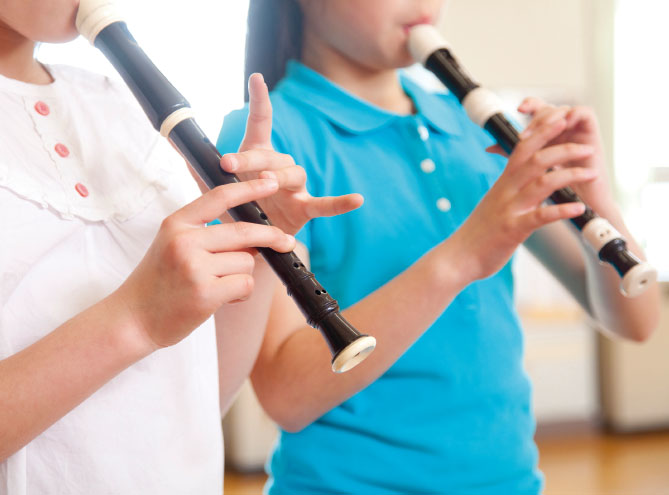
Humble recorders are rarely mentioned in the same breath as ultra-cool rock bands but Radiohead's Jonny Greenwood credits the instrument as the foundation of his musical success. The Oscar award-winning musician says he should have been more rebellious during his adolescence but he was too busy ‘learning to play the recorder and playing Bach at little village halls […]It was all down to those Oxford County Council teachers and that kind of education system.’
What proportion of state-school-educated children today learn the recorder? And would they even want toff Whole class teaching usually revolves around other instruments.
William Thompson is director of education at the instrument supplier Dawsons Music of Warrington. ‘The recorder used to be the standard ensemble instrument for most upper primary and secondary schools. Popularity has waned in recent years, not only because it's sometimes seen as uncool by children, who don't see their musical idols involved in recorder playing, but also because instruments such as ukulele and djembes have found their way into music departments.’
Dawsons still supplies thousands of recorders to schools across the UK, as well as in the Middle East and East Asia, and undoubtedly, says Thompson, ‘recorders are still used very effectively by many teachers; some swear by it as an excellent way to teach a basic pitch and notation. However, there's nothing quite as unpleasant as a classroom full of overblown recorders, and it takes skill and patience on the teacher's part to achieve a pleasant group sound.’
First notes
Charlotte Barbour-Condini was the first recorder player to reach the concerto finals of BBC Young Musician, back in 2012. Despite these issues she believes it's a good first instrument for younger children.
‘It's easy to access, relatively affordable and you can make a sound immediately, unlike other woodwind or brass instruments where you have embouchure issues. It's not perfect in that it doesn't necessarily sound pleasant from the offset, like say the piano, flute or harp, but the pros far outweigh the cons.
‘Another great thing about the recorder as an initial instrument is that it comes in different sizes – from sopranino to various types of bass instruments. This means most children can play an instrument that suits their handspan and there's also the potential to challenge students to try out different types of recorders. It gives them an opportunity to play different parts in an ensemble or to read a different clef if they're playing a bass line.’
But to organise a large group of differing abilities takes considerable skill. Carole Kendall is a specialist music teacher, a Voices Foundation practitioner, and a tutor for the PGCE course at the University of Buckingham, and while valuing the place of the recorder in music education, can also see its shortcomings when introduced, as is common, in Year 3.
‘There are significant issues with fine motor coordination in instrumental work for seven-year-olds’ she says. ‘Even holding a drum and playing it correctly is difficult at that age.
‘We have issues of dexterity with fingering, along with tonguing and breath control. Children want to make progress and become bored and frustrated if they don't. Headteachers sometimes put recorder programmes in place because other headteachers put them in place. Few ask the question of how appropriate it might be for their children.’
Barbour-Condini agrees that, ‘the recorder doesn't necessarily sound fantastic in the initial stages – it's a bit of a stumbling block. There's still the idea that it's an instrument designed exclusively for beginners and that you move on to a “real” instrument later. Partly because when people think of classical instruments, they usually think of a modern orchestra. And a recorder isn't in one of those!’
She too sees inevitable shortcomings in group lessons: ‘It can be difficult to pace group lessons in a way that works for everyone, and personally I started having individual lessons from around the age of ten but it was group lessons that got me playing in the first place when I was five.’
A long history
 ©Adobe Stock/ PayLessImages
©Adobe Stock/ PayLessImages
It can take some time before harmonious group-playing is possible
The repertoire, in the right hands, can be exciting – ‘There is so much range,’ says Barbour-Condini. ‘I've looked at music from the 14th century right up to contemporary commissions, and this is on the table for people in the early stages of learning too.
‘Another part of the image problem is that people think the repertoire is limited but it's a question of perspective – no, Brahms and Berlioz are not part of our staple diet, but equally it's not often you'll get to play Josquin Desprez or Machaut if you're a violinist!’
A senior London banker, who sadly keeps her recorder skills undercover for fear, she says, of professional humiliation, is nostalgic about her non-covert recorder playing days at primary school. But she is adamant that the recorder is not only an instrument for the young.
‘It's an accessible instrument and many older people will have learnt the recorder and remember simple tunes. These would quickly come back through finger memory and wouldn't need short-term memory. Very little strength is needed to play and so it would be ideal for older people to take up again and could even be done as a social activity. In any event, it would give a sense of achievement.’
Charlotte Barbour-Condini recommends:
Amsterdam-based recorder player Sarah Jeffery has a brilliant YouTube channel (Sarah Jeffery/Team Recorder) with a plethora of information and helpful content for everyone – from people just starting out, to those thinking of going to music college and starting a professional career. In addition, you will find all sorts of helpful resources such as tutorials on helpful techniques and exercises, books and resources for beginners, recorder maintenance, how to read sheet music, and so much more. I would highly recommend having a look if you're interested – whether as a potential or current recorder player, a parent, or a teacher.




